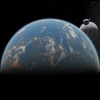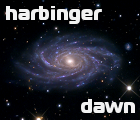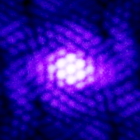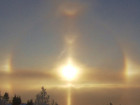|
Desert with Life - a new planet class
|
|
| SpaceEngineer | Date: Tuesday, 21.05.2013, 12:02 | Message # 46 |
 Author of Space Engine
Group: Administrators
 Russian Federation
Russian Federation
Messages: 4800
Status: Offline
| Quote (Sabratha) They don't need water.
They do need water. Every life creature on Earth is based on water. Water is a universal solvent. Cell must have liquid interior to work.

|
| |
| |
| Sabratha | Date: Tuesday, 21.05.2013, 22:35 | Message # 47 |
|
Observer
Group: Newbies
 Poland
Poland
Messages: 9
Status: Offline
| Quote (SpaceEngineer) They do need water. Every life creature on Earth is based on water.
Ok my bad, my statement was ambiguous. What I meant was that chemosynthetic bacteria can produce their own water through the use of more basic inorganic compounds. They don't need an external source of water, since they produce it themselves.
Edited by Sabratha - Tuesday, 21.05.2013, 22:46 |
| |
| |
| anonymousgamer | Date: Tuesday, 21.05.2013, 22:55 | Message # 48 |
 World Builder
Group: Global Moderators
 United States
United States
Messages: 1011
Status: Offline
| Deserts aren't necessarily completely devoid of water, at least in SE. Many deserts have clouds, most likely from water vapor.
Desktop: FX-8350 4.0 GHz, 8 GB DDR3 RAM, EVGA GeForce GTX 1080 FTW 8 GB, 2 TB HDD, 24 inch 1920x1080 screen
Laptop: Core i5 480M 2.66 GHz (turbo 2.93), 8 GB DDR3 RAM, AMD Radeon HD 6550m 1 GB, 640 GB HDD, 17.3 inch 1600x900 screen
|
| |
| |
| HarbingerDawn | Date: Tuesday, 21.05.2013, 23:19 | Message # 49 |
 Cosmic Curator
Group: Administrators
 United States
United States
Messages: 8717
Status: Offline
| Quote (anonymousgamer) Deserts aren't necessarily completely devoid of water, at least in SE. Many deserts have clouds, most likely from water vapor.
Incorrect. Every desert in SE has clouds made of dust. And also, again, desert worlds in the SE classification system are necessarily devoid of liquid surface water. The most water that a desert in SE can have (at present) is in ice form.
All forum users, please read this!
My SE mods and addons
Phenom II X6 1090T 3.2 GHz, 16 GB DDR3 RAM, GTX 970 3584 MB VRAM
|
| |
| |
| Enki | Date: Thursday, 11.07.2013, 22:29 | Message # 50 |
 Astronaut
Group: Users
 United States
United States
Messages: 67
Status: Offline
| Quote (werdnaforever) the last thing we could ever expect is DNA or a very similar molecule
Quote (DoctorOfSpace) I disagree. Rather than go in depth about it in a post I'll just post a link to a video that sums it up http://www.youtube.com/watch?v=U6QYDdgP9eg The video is not specifically about DNA but does explain how it's precursors could come to be. Seems to be that the structure of DNA is just simple chemistry in action. Simple things tend to happen in the right environments.
I partially agree with DoctorofSpace. DNA happened because the chemical structure of our universe "lead" (sort of) the substances of Earth to create it. So planets with similar chemistries to Earth with life would quite possibly use DNA. But, there are many planets with many different properties and you have to find one with similar properties to ours.
As for life like ours, or a planet like ours in existence; we would either find it very close (as something seeding the area, or an area of similar chemical composition), or very, very far away (as the law of probability dictates).
So if we find Earth 2, it's probably sitting right under our noses.
"If you arrive at a contradiction, check your premises. You will find that one of them is wrong." - Ayn Rand
"It may be that our purpose on Earth is not to find God, but to create him." - Arthur C. Clarke
|
| |
| |
| HarbingerDawn | Date: Thursday, 11.07.2013, 22:47 | Message # 51 |
 Cosmic Curator
Group: Administrators
 United States
United States
Messages: 8717
Status: Offline
| Quote (Enki) So if we find Earth 2, it's probably sitting right under our noses.
That would depend on the parameters by which we define an Earth-like world. If defined loosely, there are likely to be some in the Solar neighborhood. If defined strictly then it would probably be very far away, if it exists at all. If we just mean worlds with liquid surface water and stable climates with moderately thick atmospheres and gravity comfortable to humans, then they're probably reasonably common.
But this is pretty off topic for this thread.
All forum users, please read this!
My SE mods and addons
Phenom II X6 1090T 3.2 GHz, 16 GB DDR3 RAM, GTX 970 3584 MB VRAM
|
| |
| |
| Inarius | Date: Friday, 16.08.2013, 00:41 | Message # 52 |
 Explorer
Group: Local Moderators
 France
France
Messages: 237
Status: Offline
| I think that life can also exist on frozen worlds (such as Europe) with some under-ice oceans.
About desert, it's true that it's quite...well.
I think that life is some gaussian distribution with many parameters, such as radiation, presence of some key elements (water, or any liquid), radiation, temperature, and probably some other.
The further you are from an ideal (ie : Earth, but could be different), the harder it is to develop life and the harder it will be to maintain it alive and develop.
I think that Mars, for example could perhaps have some form of life on it and could possibly maintain it even today. Some bacteria, very resilient, could have travelled via comets and slowly adapt itself. But it's not a certitude. Desert planet can support life, sometimes. Anyway, it will be hard to have proofs, but if we go out of the "all water" dogma, we can imagine it's possible.
About the questions of Spaceengineer (27/07) : perhaps a new topic to discuss it ?
|
| |
| |
| SirSpunky | Date: Saturday, 31.08.2013, 01:30 | Message # 53 |
|
Observer
Group: Newbies
 Sweden
Sweden
Messages: 7
Status: Offline
| Wow, this thread is amazing! I'm learning so much on these forums.
I like the distinction between where life can originate and where it could survive after it's evolved. In theory, I guess life could survive almost anywhere, if evolution is given enough time to work its magic. Just look at the adaptive skills that intelligence has given humans, as we might someday even begin to colonize other planets. But that doesn't mean life can originate on any planets on its own.
If there truly are bacteria that can survive without external water sources, I guess that means they could survive on a desert planet without water, if they first originate from another planet with water and are transported to the desert planet by an asteroid or similar.
As a sidenote, I also find it hard to define life. But if we want to discuss the possibilities of more exotic life forms that aren't water-based I'm afraid we have to find a more general definition of life. Although I like it, my problem with "molecules with the ability to reproduce themselves" is how we distinguish life from molecules that cause more general chain-reactions. I'm no expert, but fire and similar phenomenons also seem to "reproduce" itself in the right environments and with enough fuel. How do we distinguish fire from life, while keeping a broad definition of life?
|
| |
| |
| Watsisname | Date: Saturday, 31.08.2013, 10:07 | Message # 54 |
 Galaxy Architect
Group: Global Moderators
 United States
United States
Messages: 2613
Status: Offline
| Fire and life can be distinguished by their information content and the way in which that information is selected for and passed on to following generations. I.e. life undergoes Darwinian evolution, whereas fire does not.
That doesn't easily help distinguish life from auto-catalytic chemical reactions, though. 

|
| |
| |
| SirSpunky | Date: Saturday, 31.08.2013, 12:32 | Message # 55 |
|
Observer
Group: Newbies
 Sweden
Sweden
Messages: 7
Status: Offline
| Thanks for clearing that out  It's a very good point. So maybe a better definition of life would be: It's a very good point. So maybe a better definition of life would be:
A set of molecules that:
* Stores information
* Reproduces itself
Actually, now that I think of it, maybe we could even narrow down the definition to only "stores information", if we could be a bit more specific on that sentence. Reproduction is necessary for life to evolve, but I'm not sure it should be necessary for something to be classified as life.
I mean, there are many animal and human individuals that can't reproduce themselves, yet we obviously classify them as life. They do, however, consist of multiple living cells, but I’m pretty sure there are examples of single cells and bacteria that through mutation lose the ability to reproduce or grow as well. Shouldn't these still be classified as life?
Unfortunately, I think I need to become a chemist before I can dig deeper into this...
|
| |
| |
| Joey_Penguin | Date: Saturday, 31.08.2013, 18:03 | Message # 56 |
 Pioneer
Group: Users
 United States
United States
Messages: 311
Status: Offline
| My books and computers are alive?
Careful. The PLATT Collective has spurs.
|
| |
| |
| Watsisname | Date: Saturday, 31.08.2013, 20:53 | Message # 57 |
 Galaxy Architect
Group: Global Moderators
 United States
United States
Messages: 2613
Status: Offline
| Watsisname's definition for Life as we know it*:
-Metabolizes (requires a source of energy to perform its normal functions)
-Responds to stimuli (is affected by changes in its environment)
-Reproduces (can create more of itself)
-Composed of units (cells) containing information describing the organism's characteristics (genes)
-Genes are carried over to following generations and undergo natural selection.
*Does not consider possibility of some utterly bizarre form of life we haven't discovered yet
Quote (Joey_Penguin) My books and computers are alive?
Lol.  Assuredly not; computers fail conditions 3, 4, and 5, and books fail all of them. Assuredly not; computers fail conditions 3, 4, and 5, and books fail all of them. 

|
| |
| |
| DoctorOfSpace | Date: Saturday, 31.08.2013, 20:56 | Message # 58 |
 Galaxy Architect
Group: Global Moderators
 Pirate
Pirate
Messages: 3600
Status: Offline
| What about a robot that COULD build another robot but can't physically reproduce?
Intel Core i7-5820K 4.2GHz 6-Core Processor
G.Skill Ripjaws V Series 32GB (4 x 8GB) DDR4-2400 Memory
EVGA GTX 980 Ti SC 6GB
|
| |
| |
| midtskogen | Date: Saturday, 31.08.2013, 21:38 | Message # 59 |
 Star Engineer
Group: Users
 Norway
Norway
Messages: 1674
Status: Offline
| Quote (Watsisname) Watsisname's definition for Life as we know it
Couldn't a computer program be designed to pass all those criteria?
NIL DIFFICILE VOLENTI

|
| |
| |
| Watsisname | Date: Saturday, 31.08.2013, 21:50 | Message # 60 |
 Galaxy Architect
Group: Global Moderators
 United States
United States
Messages: 2613
Status: Offline
| Reproduction is definitely one of the fuzzier qualifications for being a living thing. Normally I'd say that even if the individual is incapable of reproducing, it belongs to a population/species which does reproduce (or else they would die out). But then there are sterile hybrid organisms, like mules, which don't fit with this idea at all. (Poor things, they're so broken.)

|
| |
| |